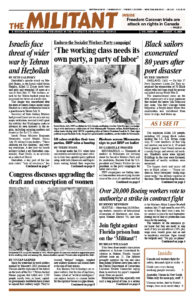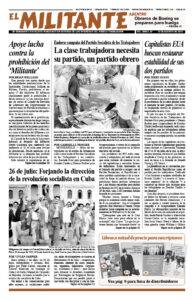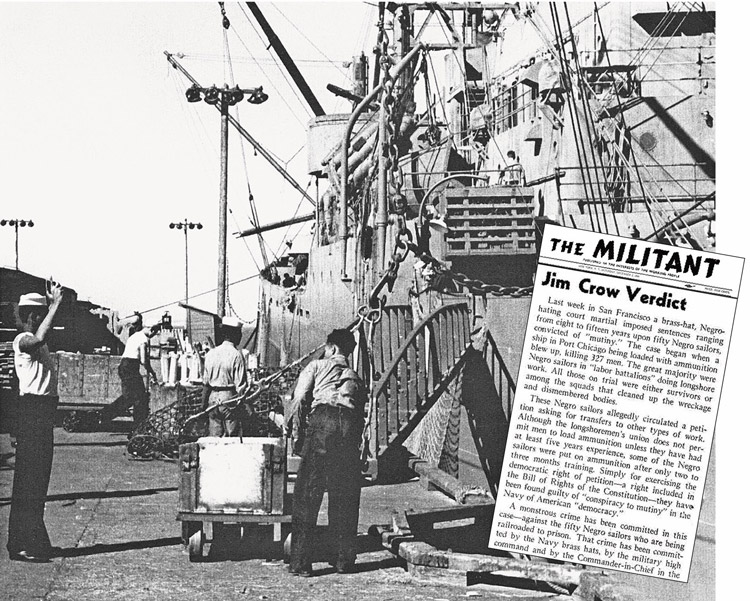OAKLAND, Calif. — On July 17 Navy Secretary Carlos Del Toro announced the exoneration of 50 Black sailors who had been tried for mutiny and jailed during World War II.
The announcement came on the 80th anniversary of a huge explosion that rocked the entire San Francisco Bay Area. The Port Chicago Naval Magazine, a freight depot where live ammunition was transferred from trains to ships, had blown up.
The explosion killed 320 people, including 203 young Black sailors loading the S.S. E.A. Bryan cargo ship; 67 crew members of that ship and another one next to it; 29 armed Naval guards; Coast Guard sailors on a nearby barge; and several rail workers. Hundreds more were injured. Buildings in the area were flattened, thousands of nearby residents were terrorized.
The biggest death and injury toll was to Black sailors — “Negro soldiers in ‘labor battalions’ doing longshore work,” the Militant reported at the time. They were loading the armaments, including incendiary bombs with their fuses already attached, into the ship’s hold.
The sailors were in segregated units, commanded by white officers who made bets on which crew could be driven to work the fastest and surpass production quotas.
The union on the docks, the International Longshore and Warehouse Union, was appalled at the way Navy officers ran the loading operation. They offered to demonstrate their own safety protocols, saying they feared a disaster. They were ignored.
The union didn’t permit workers to load ammunition unless they had at least five years’ experience, but some of the Black sailors were put on ammunition after only two to three months training. Fully 15% of all Black U.S. naval casualties in the war occurred in Port Chicago that day.
After the blast the surviving Black sailors told the Navy they wouldn’t return to work under the same unsafe conditions. The officers’ threats and harassment got 208 of them to go back to work. But when 50 wouldn’t budge, the brass charged them with mutiny.
After a 33-day show trial court martial, it took the Naval panel just an hour and a half over lunch to find them guilty and sentence them to 15 years hard labor. These sentences were cut short at the end of the war.
The other 208 were convicted of disobeying orders and given bad conduct discharges. They weren’t paid for three months.
“A monstrous crime has been committed in this case — against the fifty Negro sailors who are being railroaded to prison,” the Militant said in a Dec. 2, 1944, editorial entitled “Jim Crow Verdict.”
‘Crime committed by Navy brass’
“That crime has been committed by the Navy brass hats, by the military high command and by the Commander-in-Chief in the White House [Franklin Roosevelt at that time], who enforce Jim Crow policies in the armed forces and relegate Negro sailors to the most menial and dangerous tasks.”
The Militant campaigned for the verdict to be overturned.
It took 80 years for the Navy to admit the wrong that was done. A lot of credit goes to Robert Allen, who brought the story of the Port Chicago sailors to light in a book, The Port Chicago Mutiny. It was published in 1989 after he interviewed many of the surviving sailors. The facts he uncovered were damning and led relatives of workers on the dock, supporters of Black rights and others to fight to overturn the convictions.
All 50 men who set this example of resistance are now dead, as is Robert Allen, who died July 10, just a few days before the exoneration. It is up to us to keep the story alive and draw the lessons that are important for all workers today.
Del Toro, Secretary of Defense Lloyd Austin and numerous politicians, including Kamala Harris, have all praised the Navy’s exoneration, but continue to cover up what was really involved.
During World War II opponents of Jim Crow segregation and racist oppression refused to keep quiet. The history of this movement is recorded in the excellent book published by Pathfinder Press, Fighting Racism in World War II.
The Roosevelt administration maintained the segregated armed forces to carry out the aims of the U.S. imperialists in the war while police brutality and lynch-mob violence were rampant in the North as well as the South. The explosives shipped through Port Chicago were used by Washington to advance its imperialist interests in the Pacific. U.S. napalm burned down the workers’ districts in Tokyo, killing 100,000 civilians. In August 1945 the U.S. rulers dropped atomic bombs on Hiroshima and Nagasaki.
The war in the Pacific was a war between two imperialist nations — the U.S. and Japan — over which power would dominate and profit from exploitation of Asia and the South China Sea.
Fight against Jim Crow
Far from supporting the fight for Black rights during World War II, Roosevelt, both the Democrats and Republicans, as well as the Stalinist Communist Party fought to hogtie the movement for Black rights as well as the union movement in the name of support for the U.S. war effort. The rise in the fight against Jim Crow, coupled with the powerful effects of colonial uprisings on the heels of the war, forced the rulers to finally desegregate the armed forces, starting in 1948.
Not only did it take 80 years for the Navy brass to finally exonerate the sailors, but their motivation had nothing to do with Black rights or justice. Their goal is to improve the image of the U.S. military, in hopes of making it more effective in the new wars the capitalist rulers are preparing.
The fight for Black rights during World War II, and the mass proletarian movement that crushed Jim Crow, have put working people in a stronger position to unite and fight against low wages, speedup, high prices and all the ills brought by the capitalist system today, including racist oppression.
The SWP 2024 campaign will help get out the truth about the Port Chicago mutiny trial and explain that working people can move forward only if we break with the parties of the bosses and form our own party, a party of labor, to unite all those exploited by capital. A party that can put us on a course to take political power into our own hands.
Eric Simpson is the Socialist Workers Party candidate for U.S. Congress in California’s 12th District.


